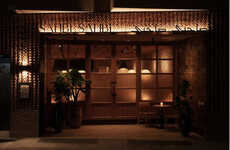
The Refettorio Felix is a Beautiful Soup Kitchen Owned by a Renowned Chef
Ellen Smith — June 16, 2017 — Art & Design
References: foodforsoul.it & dezeen
The shame and stigmas attached to establishments like soup kitchens often overpowers their benefits, which is why renowned British chef Massimo Bottura conceived The Refettorio Felix, a gorgeously decorated community dining hall for those in need.
The center sources high-quality leftovers from restaurants that would otherwise go to waste, providing the dining hall with the ability to serve high-end food at an incredibly low cost. The soup kitchen's interior is thoughtfully decorated and features a calming sea foam green paint, with whimsical paper lanterns hanging from the ceiling, potted plants, and plenty of natural light. The non-profit described interior design as a "universal pleasure that's missing from a lot of social projects." The implementation of a well designed soup kitchen provides an opportunity for vulnerable people to be alleviated from the stigmas of impoverishment.
The center sources high-quality leftovers from restaurants that would otherwise go to waste, providing the dining hall with the ability to serve high-end food at an incredibly low cost. The soup kitchen's interior is thoughtfully decorated and features a calming sea foam green paint, with whimsical paper lanterns hanging from the ceiling, potted plants, and plenty of natural light. The non-profit described interior design as a "universal pleasure that's missing from a lot of social projects." The implementation of a well designed soup kitchen provides an opportunity for vulnerable people to be alleviated from the stigmas of impoverishment.
Trend Themes
1. Upscale Community Kitchens - Entrepreneurs can explore the idea of opening stylish yet affordable soup kitchens that can cater to the underserved population.
2. High-quality Leftovers - Food operators and establishments can provide nutritious and delicious meals for soup kitchens and charities by donating their unused high-quality ingredients and products.
3. Interior Design for Social Projects - Interior designers and architects can incorporate their skills into social projects and design attractive and comfortable spaces for people in need.
Industry Implications
1. Hospitality - Hotels, restaurants, and catering companies can donate leftover food to soup kitchens and charities and help alleviate hunger in communities.
2. Non-profit and Charities - Non-profits and charities can collaborate with chefs and designers to create attractive and welcoming community dining halls that can serve healthy and delicious meals to the underserved population.
3. Food Waste Management - Entrepreneurs can explore the food waste management industry by creating innovative solutions that reduce food waste from restaurants and other food establishments and repurpose it for charitable causes.
3.9
Score
Popularity
Activity
Freshness























